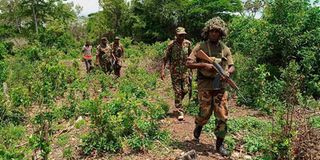Capitalise on Al-Shabaab woes to pacify the region

Kenyan security officers comb Boni Forest in Lamu County for Al-Shabaab terrorists during the Linda Boni Operation.
What you need to know:
- Al Shabaab has suffered massive debilitating defections, including of over 300 Kenyans who returned home last month.
- The Al-Qaeda-linked group has also been carrying out internal executions, mostly on foreigners.
Despite Somalia-based Al-Shabaab putting up a brave face of a resurgent Jihadist movement, recent developments paint a different picture. The terrorist group has suffered massive debilitating defections, including of over 300 Kenyans who returned home last month.
The government and civil society groups have been reintegrating them into society. The returnees narrated their suffering, torture and mistreatment in Al-Shabaab camps in Somalia. They recalled local militants killing their foreign colleagues and prisoners of war on flimsy grounds. Foreign defectors in Kenya are waiting to go back home.
Hundreds of Al-Shabaab militants were also executed by Federal Government of Somalia and Federal Member States (FMS) for atrocities against civilians and government officials — including 21 by Puntland Regional Government late last month. The Al-Qaeda-linked group has also been carrying out internal executions, mostly on foreigners. At a recent one of about 10 members, a Kenyan fighter was executed for refusing to kill his compatriot.
Executions is a common weapon used to silence ‘rebels’ or eliminate competition. One of its top-ranking Kenyan commanders, Ahmed Iman Ali alias Moalim Eyman, suffered the fate soon after the United Nations Security Council unanimously approved sanctions against him early this year. The terrorists felt that it accorded the Jaysh Iman leader clout, making him a threat to their ambitions. That caused a rift between local and foreign militants.
Al-Shabaab leader Ahmed Omad Diriye is unable to offer proper leadership due to a terminal illness. He spends most of the time outside the country, especially India, for chemotherapy sessions. The group’s spokesman, Ali Dhere, is also in Qatar for cancer treatment. That has created a crisis.
Al-Shabaab’s challenges
Al-Shabaab has also not been spared from the Covid-19 pandemic with thousands of militants succumbing to the disease. A ridiculous decree to kill Covid-19-positive fighters seeks to cut medical costs.
Security experts cite financial constraints as one of the reasons the outfit has not carried out a major attack for a long time. Most of its operations in Kenya have failed due to poor planning, lack of expertise and government robust counter terrorism measures.
Recently, Kenyan police intercepted at Liboi border point, Garissa County, its donkey-assisted unit carrying guns and bomb-making materials. Early last month, more than 60 militants, including foreign ones, were killed in a camp in Qoryooley, southern Somalia, in a bomb assembly explosion.
The electioneering period in Somalia has also had a toll on Al-Shabaab as some members eye political seats at the expense of the group’s activities. This has forced them to retreat to their clans for support.
Al-Shabaab’s challenges have reduced it to a shell. Staring at imminent collapse, it cannot even attract potential recruits for a revamp. Kenya should capitalise on these weaknesses to mount robust counter-terrorism measures, including encouraging more Kenyan militants to return home for rehabilitation.
Mr Mugwang’a, a communications consultant, is a member of the Crime Journalists Association of Kenya (CJAK). [email protected]





